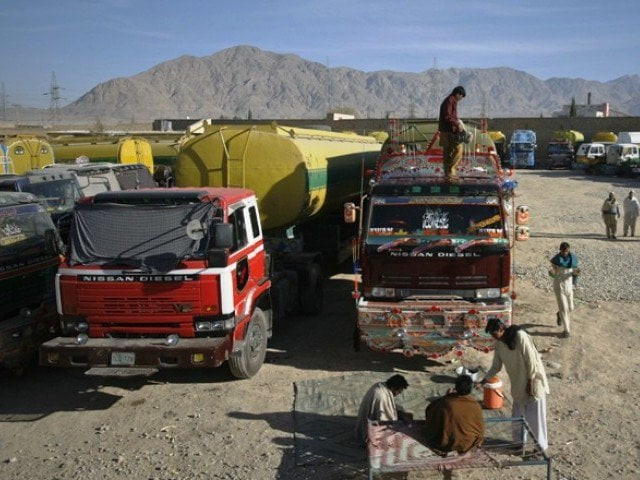Oil tankers to stop supply if govt refuses to increase freight
Tanker owners threaten to go on strike from Oct 23

Oil tankers. PHOTO: REUTERS
In a letter sent to the Oil and Gas Regulatory Authority (Ogra) chairman on October 14, the All Pakistan (Ittefaq) Oil Tankers Owners Association has sought an immediate increase of 70% in freight rate, which will be passed on to the consumers.
They have also demanded that each tanker of all oil marketing companies (OMCs) should be allowed to carry a load of up to 32,000 litres during transportation.
Fear of petrol shortage as oil tankers go on strike
The association recalled that a previously planned strike beginning July 24 was put off after the petroleum secretary gave assurances to them that their demands would be met. Several meetings were held later, but no solution could be agreed.
Different associations of oil tankers have already gone on strikes in the past few months in a bid to press Ogra to give them sufficient time to meet safety standards.
Ogra has been forcing the transporters to meet the safety and quality guidelines introduced in 2009. Efforts to enforce the regulations gathered pace after an oil tanker overturned in Ahmedpur Sharqia, Punjab in June 2017, which led to the death of over 200 people.
Among the key standards was that all oil tankers should have four axles, one more than the present ones in most such vehicles in the country. Axles support the vehicle’s body weight and add stability, reducing the chances of overturning.
As the oil tanker owners threaten time and again to stop oil supplies, the Petroleum Division is in the process of giving the task of building an oil pipeline from Machike (Sheikhupura) to Tarru Jabba (Peshawar) to state-owned Inter State Gas Systems (ISGS) in a bid to streamline fuel supplies and curb theft. ISGS will invite interested investors to pour money into laying the pipeline.
Repeated strikes by the oil tanker owners to press authorities to meet their demands and deadly tanker accidents have been a matter of grave concern for the government. Tanker owners and drivers have also been allegedly involved in oil theft at different depots of Pakistan State Oil (PSO) and power plants.
Since its creation, ISGS has been dealing with gas pipeline projects like Iran-Pakistan, Turkmenistan-Afghanistan-Pakistan-India (Tapi) and North-South gas pipelines.
Oil tankers strike: Provinces agree to defer 16% sales tax till June 30
According to experts, oil pipelines are a safer mode of transportation as an estimated $200 million worth of furnace oil is stolen every year during transportation through tankers. In order to drum up support for the oil pipeline plan, the Petroleum Division has sent a summary to the ministries concerned to seek their comments before tabling it in an Economic Coordination Committee (ECC) huddle for approval.
Tariff for the pipeline will be determined through competitive bidding. The project will be executed in three phases based on build-operate-transfer model with concession period spanning 15 years.
Earlier, Pak-Arab Refinery (Parco) - a joint venture between Pakistan and Abu Dhabi - was offered to lay the oil pipeline, but it stayed away, arguing that the project was not financially viable because of expected low volumes.
At present, domestic refineries produce 13 million tons of petroleum products per annum against the demand for over 24 million tons. The balance is imported by PSO and private sector OMCs. Demand for petrol is growing at a pace of 20% and diesel at 10% per annum.
Published in The Express Tribune, October 17th, 2017.
Like Business on Facebook, follow @TribuneBiz on Twitter to stay informed and join in the conversation.



















COMMENTS
Comments are moderated and generally will be posted if they are on-topic and not abusive.
For more information, please see our Comments FAQ